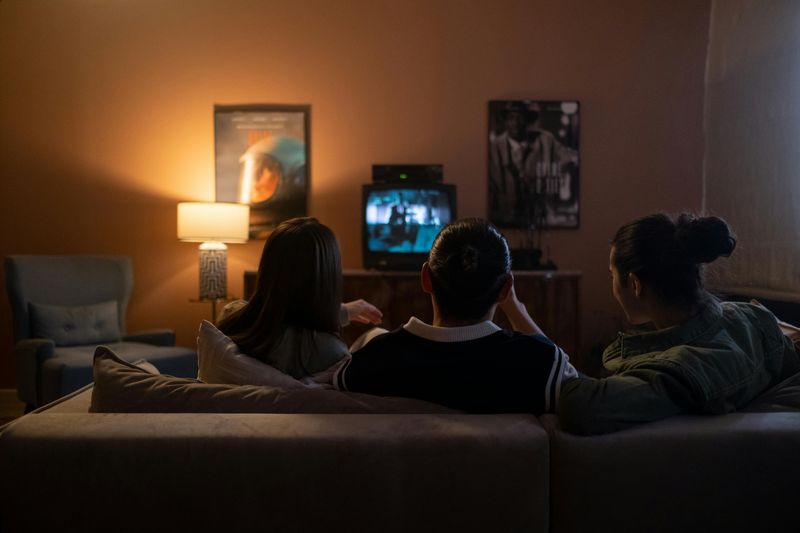As people age, sleep patterns often undergo significant changes. Many older adults find themselves turning to the television as a sleep aid. This reliance stems from a variety of needs and comforts that the glow and sound of the TV provide. Whether it’s the comforting background noise, the distraction from racing thoughts, or the sense of companionship in an otherwise quiet home, the TV has become a nighttime staple for many. Understanding these reasons can offer insight into the evolving relationship between aging individuals and their nighttime routines, highlighting the importance of comfort, familiarity, and emotional well-being in the pursuit of restful sleep.
1. Background Noise for Comfort

The gentle hum of a TV can be a soothing balm for the unsettling silence that often accompanies aging. For many, the quiet can feel oppressive, amplifying feelings of loneliness or anxiety. The familiar background noise produced by a television provides an auditory comfort blanket, wrapping the listener in a cocoon of sound.
This can make the difference between tossing and turning and drifting off peacefully. Moreover, the content of the programs can also add another layer of comfort, with familiar shows or voices easing the transition into sleep. This auditory presence helps create a sense of safety and relaxation.
2. Distraction From Racing Thoughts

As we age, the mind often becomes a whirlpool of thoughts, particularly at night. Concerns about health, family, or finances can prevent a peaceful slumber. The TV offers a welcome distraction, pulling the mind away from its preoccupations.
By focusing on a storyline or the rhythmic flow of dialogue, the mental chatter is quieted. This shift in focus can significantly aid in the transition from wakefulness to sleep. Additionally, engaging with a visual story provides a cognitive shift, helping the viewer unwind. This redirection of thoughts can be a vital tool in achieving restful sleep.
3. Replacement for White Noise Machines

White noise machines are a popular choice for drowning out background sounds, but they lack the engaging quality of a TV. For some, the television provides a more dynamic and natural auditory experience. The variability of TV soundtracks creates a richer soundscape than the static drone of a machine. This dynamism keeps the mind gently occupied without requiring active attention.
As the narrative unfolds, it masks intrusive sounds from outside or within the house. The TV thus serves as an excellent replacement for those who find traditional white noise machines too monotonous or artificial in their sound production.
4. A Sense of Companionship

For many living alone, the presence of TV voices and laughter can simulate a lively household. The dialogue and interactions on screen fill the room with a sense of life and energy, warding off the isolation that can be felt in silence. This semblance of companionship can be especially comforting during the quiet hours of night.
The emotional engagement with characters and storylines provides a feeling of social connection, even in solitude. This virtual companionship may not replace human interaction, but it offers a valuable emotional bridge, making nighttime feel less isolated and more connected.
5. Habit From Younger Years

Old habits die hard, and for many, falling asleep to the glow of the television is a long-standing tradition. This practice often starts in youth, perhaps with late-night shows or family movie nights, and naturally extends into adulthood.
The continuity of this habit provides a comforting ritual that signals the body it’s time to wind down. Memories of younger days spent in front of the TV add a layer of nostalgia, enhancing the soothing effect. This ingrained bedtime routine is a familiar friend, offering consistency and ease in the transition to sleep as the years go by.
6. Reducing Awareness of Aches and Pains

Aches and pains are common companions of aging, often disrupting sleep. The TV acts as a mental analgesic, diverting attention from physical discomfort. By focusing on a captivating show, the mind can temporarily forget the twinges and aches. This cognitive distraction can significantly enhance the quality of sleep, allowing for more restful and uninterrupted nights.
Engaging with a narrative or visual spectacle offers a respite from bodily concerns, providing a mental escape. This shift in focus from physical to mental can be a crucial strategy for managing nighttime discomfort and enhancing overall sleep satisfaction.
7. Regulating Sleep Environment

A well-regulated sleep environment is essential for restful nights. The TV contributes to this by masking disruptive noises, such as creaks or outdoor sounds, that might otherwise disturb sleep.
The gentle glow and sound of the television create a comforting atmosphere, making the bedroom feel safe and secure. This sense of security is crucial, especially for those who might feel vulnerable or anxious at night. The TV’s presence transforms the sleeping space into a haven, where the mind can relax, undisturbed by external disturbances. This regulation of environment plays a pivotal role in fostering a peaceful night’s sleep.
8. Helps With Insomnia

Insomnia can be a persistent challenge, especially as we grow older. The TV serves as an accessible remedy, offering a mental diversion that can ease the transition into sleep. By providing engaging content, the television helps to shift focus away from the frustration of sleeplessness.
This distraction can relax the mind and body, paving the way to sleep. The soft glow and steady sound create a soothing environment, conducive to drifting off. For those wrestling with insomnia, the TV becomes a trusted ally, transforming the daunting task of falling asleep into a manageable and gentle process.
9. Emotional Soothing

Revisiting favorite shows or channels can evoke a sense of nostalgia and emotional soothing. For many, these programs are not just entertainment but familiar friends. The memories attached to beloved characters or storylines provide reassurance and comfort. This emotional connection helps ground an individual, offering a soothing end to the day.
Watching familiar content eases stress and creates a sense of calm, essential for a restful night. The TV becomes a portal to comforting memories, wrapping viewers in warmth and nostalgia as they prepare to sleep. This emotional support is invaluable in fostering a peaceful and contented state of mind.

Comments
Loading…